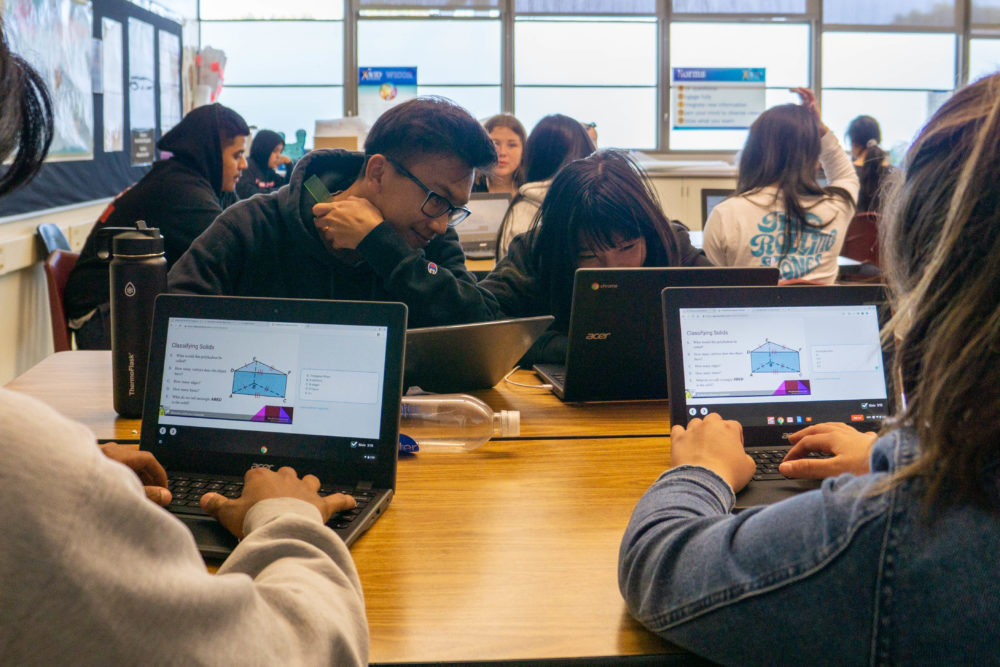
By Lauren Nguyen, Staff Writer, & Bethany Pham, News Editor
This year, Westminster High School (WHS) is piloting the 1:1 Chromebook system for the district. Baron Banner had the opportunity to visit Westminster’s campus, see how classrooms were integrating Chromebook usage and talk to both students and teachers about their thoughts on the new program.
Students at WHS have, for the most part, preferred having their own personal laptops than only having class sets of Chromebooks for certain periods. The students say it gives them access to the Internet whenever they need it and eliminates the need for them to stay after school or spend their lunch working in the library.
“[With] class sets, you wouldn’t be able to take it home so if you didn’t finish something, you wouldn’t be able to finish it at home if you didn’t have a computer,” Valdez said. “When they told us that we were going to have Chromebooks, I was like ‘yeah!’ I could finally work on it at home.”
Moreover, they like the reduction in paper consumption as well as the easy document organization that Chromebooks entail.
“I like how it totally eliminates the use of paper and helping the environment,” said WHS junior Bryan Valdez. “And everything is in one place instead of having papers; if you lost one paper, then you had to go ask for another piece of paper, but now you can just make a copy of something, edit it, and turn it in. It’s fast and easy.”
However, WHS students complain about being given work that limited activity to only taking notes, presentations and typing.
“I feel like the school could try to make the activities on Chromebooks more interactive because in some classes, we only use them for note taking. Something more interactive like using Pear Deck where you can discuss would be more interesting,” said WHS junior Jeffrey Devin Louris.
Teachers at WHS liked integrating technology into their lesson plans with the one-to-one system through various educational websites and applications. Now it’s common to see geometry teachers giving follow-along presentations through Pear Deck while students solve questions on scratch paper, groups of English classes working outside in groups and world language classes recording videos on Flipgrid.
“It’s funny because I was resistant to the one-to-one; I’m more of a book learner myself,” said WHS science teacher Lynn Graham. “That took a learning curve for me, and now I really like it because I see the kids more engaged. I see them going deeper into stuff.”
But not all teachers have shifted completely over to the laptops, and it’s caused the teachers who use Chromebooks more a bit of grief.
“Some teachers don’t use it as much as others, which is great; that’s their teaching preference,” said WHS English teacher Christina Zeltner. “But years later, I’m re-teaching a lot of these basic things like your [Google] Drive, email and whatnot, so it’d be great if we could all get on the same page in that regard.”
Although having their own personal Chromebooks means students will be more exposed to the Internet and might be tempted to use it for unrelated activities, it seems that it has not been a pressing issue at WHS. However, teachers have been reworking the way they teach to keep students focused.
“If the kids have the Chromebooks facing themselves, and I’m at the front of the room, then they’re gaming, so that’s an issue,” said Graham. “If the management from the teacher is tight where they’re walking around, monitoring, helping and showing how to do better search techniques, it’ll improve the overall classroom workability with the laptops.”
Both students and teachers at WHS note that the biggest struggle they encounter with Chromebooks is charging their laptops. A dead Chromebook poses big issues when the class’s activity is structured around using one, but WHS is fortunate enough to have three spare Chromebooks with chargers in every class for their students.
FVHS may not be able to acquire these extra commodities because of its much larger student population, and that fact remains to be a concern among FVHS teachers. A student who has his or her laptop die in the middle of class or has forgotten it altogether may miss out on a class activity.
Regardless, teachers remain hopeful that FVHS will benefit from the one-to-one system.
“I think that the Chromebook system is a very compassionate thing that the district has decided to do,” said FVHS English teacher and technology resource coordinator David Theriault. “We’re trying to do the right thing, but students and teachers are all going to sacrifice a little bit in order to make sure we’re all on the same page. We’re all going to make mistakes, both teachers and students, but we’re going to fix them as we go.”





